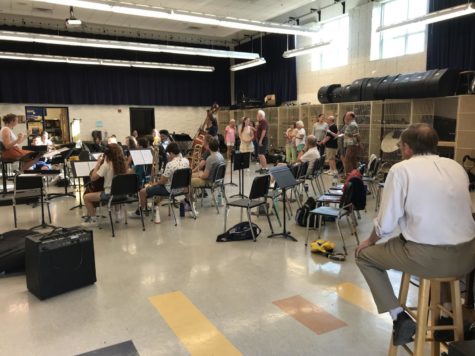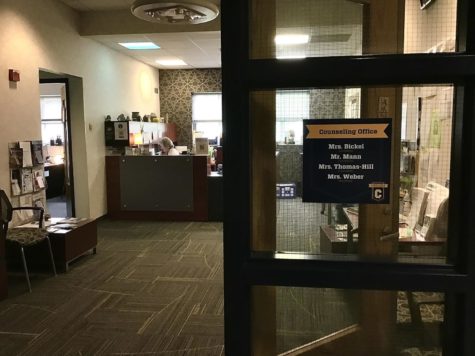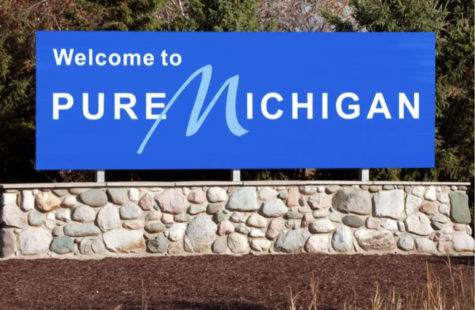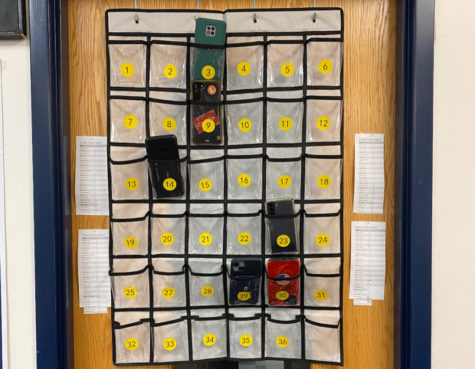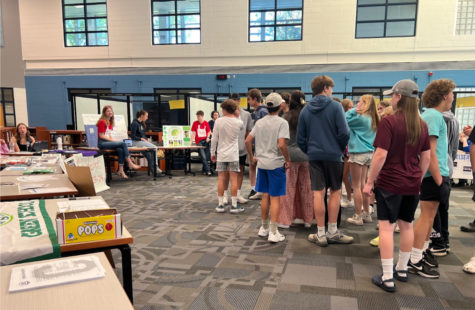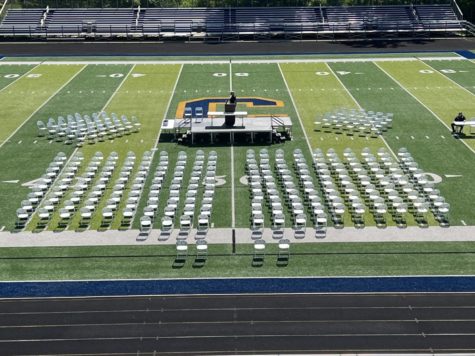Student Perspective of the 2022 School Board Election
This year, four seats are available on the Chelsea School Board. Dr. Glenn Fox, Kate Henson, Michelle Craig, Dr. Scott Moore, John Piatt, Tom Golding, Ross Greenstein, and Julianne Mallie are all running for positions on the Board this year. The intense media coverage of activities and the use of social media has made this a very well-known election among parents, teachers, and students. Often, students are overlooked in this conversation due to many not being of voting age and thus not having a voice in the policies that affect them the most.
In order to provide students a platform, The Bleu Print has interviewed students from Chelsea High School to take into account the wide range of opinions, thoughts, and perspectives on the School Board election.
Chelsea senior Liam Juergens, who founded the Chelsea High School Chess Club and plays cello in Concert Orchestra, is aware of the heightened polarization surrounding this year’s election in Chelsea. Juergens believes that having many different opinions floating around, while possibly uncomfortable, can be beneficial for the community in the long term.
Another senior, Annaliese Rivers, is involved in Girl Scouts and extracurriculars like the Theater Guild and Chamber Choir. Rivers has noticed yard signs and talk in school surrounding controversial topics and the use of buzzwords around this year’s school board election. Though Rivers wasn’t versed in politics before this year, she quickly became engaged in this year’s midterm election due to what is at stake. Since then, she has gained knowledge and developed opinions based on the candidate’s stances and supported those who aligned with her morals.
Sophomore class president Jordan Nelson participates in extracurriculars such as the Theatre Guild and the school band. He became interested in the election for School Board primarily because he knows one of the candidates personally. Nelson is excited about this election and what the outcome has to offer the district.
Sophomore Eric Cameron, is a member of the varsity Quiz Bowl Club and a runner on the cross-country team. Cameron sees great importance in this election and was compelled to research the candidates because he knows he will be affected by the new candidates’ decisions.
The Bleu Print asked students to give their opinions on specific topics that have been extremely relevant in discussions throughout this year’s election process. These questions focus on the ideas of candidates’ social media presence, prayer in school, the pledge of allegiance, book banning, and Critical Race Theory.
Social Media
When asked how he felt about the social media presence of candidates and the race in general, Cameron had little to say, but multiple students acknowledged that social media is affecting this election.
“I actually haven’t seen any advertisements on social media about the candidates,” Cameron said. “I found out a lot about candidates through yard signs and the local paper.”
Nelson feels slightly conflicted about the social media presence of the election. Though he understands the need to be “as public as possible,” he finds himself thinking less of some candidates as a result.
“The intense social media presence of some candidates has reinforced how little some candidates personally know the stakeholders in this election; the members of the greater Chelsea community,” Nelson said.
Juergens thinks that the social media presence of the election has been predominantly negative and overly critical of the candidates.
“People don’t usually post about how great something is, but rather just post complaints/criticisms of things,” Juergens said. “I think the same has been true for the School Board election, mostly I’ve heard just negative things.”
Prayer in School and The Pledge
On the topic of prayer in school, Juergens seemed to see little difference between this and any other activity.
“If, say, you have a couple of church friends, I think you can have a prayer group, just don’t go around telling people […] ‘we’re better than you [because] we have a prayer group,’” Juergens said. “It’s not harming anybody. Just don’t get in people’s faces.”
He feels similarly about the Pledge of Allegiance. Although it’s such a normal part of the school day for many students, it has a somewhat similar principle to prayer in school.
“It’s just a personal preference,” Juergens said. “[Everyone] should be able to choose.”
“I don’t think anyone should be forced to say the pledge,” Rivers said. “If somebody wants to, they of course should. That goes for prayer too, I just believe it shouldn’t be in the classroom.”
Nelson has somewhat stronger views on prayer and the pledge of allegiance. As a Christian, he feels “very fortunate” to live in a country such as the United States in which schools do not align themselves with specific belief systems.
“Some governments around the world make faith-based education compulsory,” Nelson said. “Faith is a personal choice.”
Nelson is no less passionate when it comes to the Pledge of Allegiance, and it’s meaning to him.
“An experiment running 246 years and counting, the United States is truly something to be proud to be a part of,” Nelson said. “To reject this higher calling of dedication in the form of the Pledge of Allegiance is nothing less than selfishness.”
Critical Race Theory
Critical Race Theory, or CRT, is the name of a class at Harvard that explores how racism has affected the foundations and history of the U.S. The term has been largely adopted as a buzzword used by individuals who may believe that children taught CRT are being told they should be ashamed of their white ancestors.
Juergens believes that the lens of history is distorted and that there is no need to be ashamed of one’s ancestors.
“I think you can put anybody literally in the past into a modern-day perspective, and they’ll look like a bad person,” Juergens said. “We can definitely learn from history, but [we] can also celebrate heritage.”
Nelson doesn’t see a lot of discussion on Critical Race Theory in Chelsea and believes that it is a reflection of the city’s demographic.
“Chelsea is not a very diverse community, and that is reflected in the school district,” Nelson said. “I think this has prevented CRT from taking root in Chelsea.”
Book Banning
Book banning has been a hot discussion topic recently and a source of controversy even in Chelsea where Toni Morrison’s The Bluest Eye was brought under the microscope.
Juergens questions how effective book banning is at protecting students from inappropriate content.
“You don’t have to go to the school library to find every single book you want to read,” Juergens said. “There are a million and ten different places where you can get the exact same book, so I’m not sure about the effectiveness.”
Rivers is aware of the debate and has a strong stance on the assessability of books to students in the district.
“Books provide insight into some of the issues that still exist in our world today,” Rivers said “[Books] give us knowledge and are important to learn from. I don’t think we should ban books, it is unnecessary.”
Cameron does not seem to see many issues with banning books, as long as there is a truly legitimate reason.
“There are few reasons why any books should be banned,” Cameron said. “The only major reason I could think of is if the book contains obscene material in it.”
Nelson, who is involved in student government, is very outspoken when it comes to topics like book banning.
“If parents don’t want their child reading certain material, there are endless literary alternatives,” Nelson said. “Much like a toddler won’t eat broccoli; if you don’t like it, don’t read it.”
The Election
As high schoolers grow and get more involved in community politics, they form expectations, ideas, and thoughts about what they want from the School Board and what the candidates can do for them.
Annaliese Rivers believes that students are the priority when it comes to making decisions, despite the drama parents have brought to the election via social media.
“The role of a school board member should have the best interest of the students,” Rivers said. “They need to care for students’ well-being and have to understand how their decisions affect teachers and students along with people in the community.”
Rivers feels that in the past, the focus has drifted from the students towards the parents and that students deserve more. Rivers hopes that during this election, students will be given more attention and representation within the Board itself–aside from student liaison.
“I want students to rise up and care about what decisions are being made about their education and have more representation,” Rivers said. “Even though we can’t vote, we do have opinions about what is going on regarding our own education.”
On a separate note, Rivers was alarmed by a proposal from one of the candidates regarding parents being notified when their child seeks counseling.
“I think the idea of parents being notified when their child goes to a counseling appointment is a horrible idea,” Rivers said. “This will lead students to avoid reaching out for help and guidance. I feel it is borderline a confidentiality issue. I feel very passionate about this because children need someone they can trust and that might not always be their parent, and they have to accept that.”
Cameron hopes this election will result in well-thought-out decisions that will not only benefit parents but the student body and makes the community more united.
“Some of the candidates promised to make sure decisions are made in accordance with the community and parents,” Cameron said. “I like the idea of making sure parents and the community as a whole have a role in decisions.”



